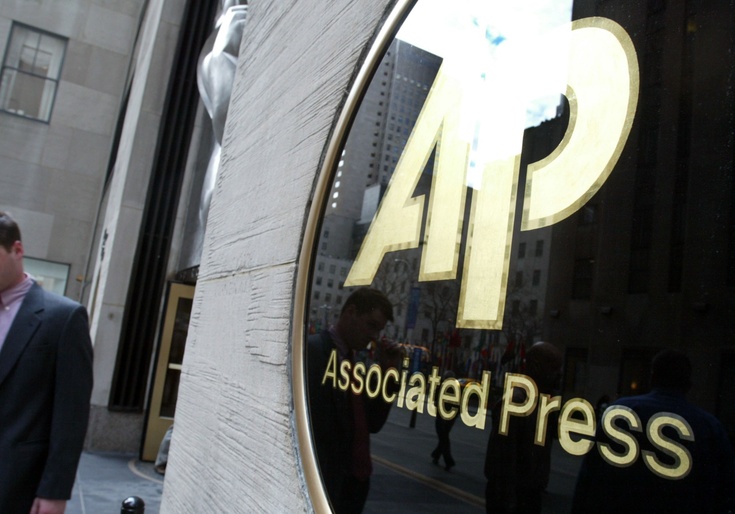The Associated Press claims the money it receives from left-wing groups does not affect its reporting on climate change. But, for whatever reason, the AP's climate coverage looks a lot like left-wing activism.
The Washington Free Beacon reported last week that the AP in 2022 took $300,000 from the KR Foundation, a Danish nonprofit committed to the "rapid phase-out of fossil fuels" and transforming journalists into "community activists for climate change." The group also seeks to pressure "U.S. banks out of fossil fuels," block new oil and gas drilling project, and shut down "some existing [oil and gas] infrastructure. "
Last year, major charities, including the Hewlett Foundation and the Rockefeller Foundation, began funding the AP's "sweeping climate journalism initiative" meant to "infuse climate coverage in all aspects of the news report."
Here's a closer look at some of that reporting.
At the end of 2023, the AP highlighted photos that it said reveal the "intensity, insecurity and inequality" of climate change, because "numbers can’t reflect the way climate change is experienced."
The impact of #ClimateChange-induced disasters in 2023 can be tallied with numbers, but numbers fail to encapsulate the lived experience of climate change.
See the @AP photos from 2023 that tell the story of a changing world. https://t.co/9iBJiNwBLK
— SEI Climate (@SEIclimate) January 7, 2024
(Numbers compiled by climate scientist Bjorn Lomborg indicate that annual deaths related to climate-related disasters have fallen 98 percent over the past century.)
In November, under the headline "How Did Humans Get to the Brink of Crashing Climate?" the AP quoted experts to make a case that values like civilizational growth and productivity emanate from the "long tentacles" of white people's historic "feelings of racial and cultural superiority." The solution, according to the report, is the elimination of fossil fuels as part of "radical shifts away from centuries-old ideas of progress," which "historians agree ... can shape a better future."
From Mexico City's drained lake to Britain's coal-powered industrial rise, our history of altering the environment for 'progress' has led us to the brink of a #climatecrisis. It's time to rethink our approach to nature and energy.
Read more⤵️https://t.co/buH7l8EPEH
— The New York Climate Exchange (@NYClimEx) November 28, 2023
(Experts also agree that energy from oil and gas enabled modern luxuries, such as liberal democracy.)
The AP has regularly given sympathetic coverage to disruptive climate protests around the world.
Last month, the AP suggested readers should not be fooled by a "boisterous" climate rally in Brussels because the protesters had a "serious" message: "Act now to stop the world from destroying itself."
After 20 climate protesters were arrested for blocking rush-hour traffic in downtown Boston in September, the AP emphasized that commuters were only "briefly" waylaid. The report went on to parrot the activists' demands at length: "Carbon dioxide, which is released when fossil fuels are burned, traps heat in the atmosphere and is largely responsible for the warming of the climate. This spring, carbon dioxide levels in the air reached the highest levels they’ve been in over 4 million years, the National Oceanic and Atmospheric Administration said earlier this month."
Days later, the AP glorified climate protesters who illegally blocked a highway in the Netherlands and had to be dispersed by police with water cannons: "Protesters on the front line held up their fists in resistance or put their heads down to protect themselves from the jets of water. Those farther back danced and jumped up and down under the spray, appearing to enjoy the shower on an unusually hot September day for the Netherlands."
In the AP's frequent critical reporting on the energy industry—from where oil wells are drilled to proposed government regulation—the companies' perspectives are often absent. Democratic government bureaucrats and climate activists are quoted instead. An April article about increasing methane emissions featured one third-party perspective: the professor behind a 2021 op-ed titled "Let’s Start Naming Climate-Related Disasters for Polluters and Their Enablers," who called the trend "very frightening."
The AP is attuned, however, to the ways oil and gas companies shape the conversation about climate policy. The news agency warned in a November analysis of a "large, yet often murky" presence of "fossil fuel interests" at climate talks.
Asked about the monied interests that fund its own climate coverage, the AP assured the Free Beacon in an email: "No outside group has any influence over AP’s journalism."
